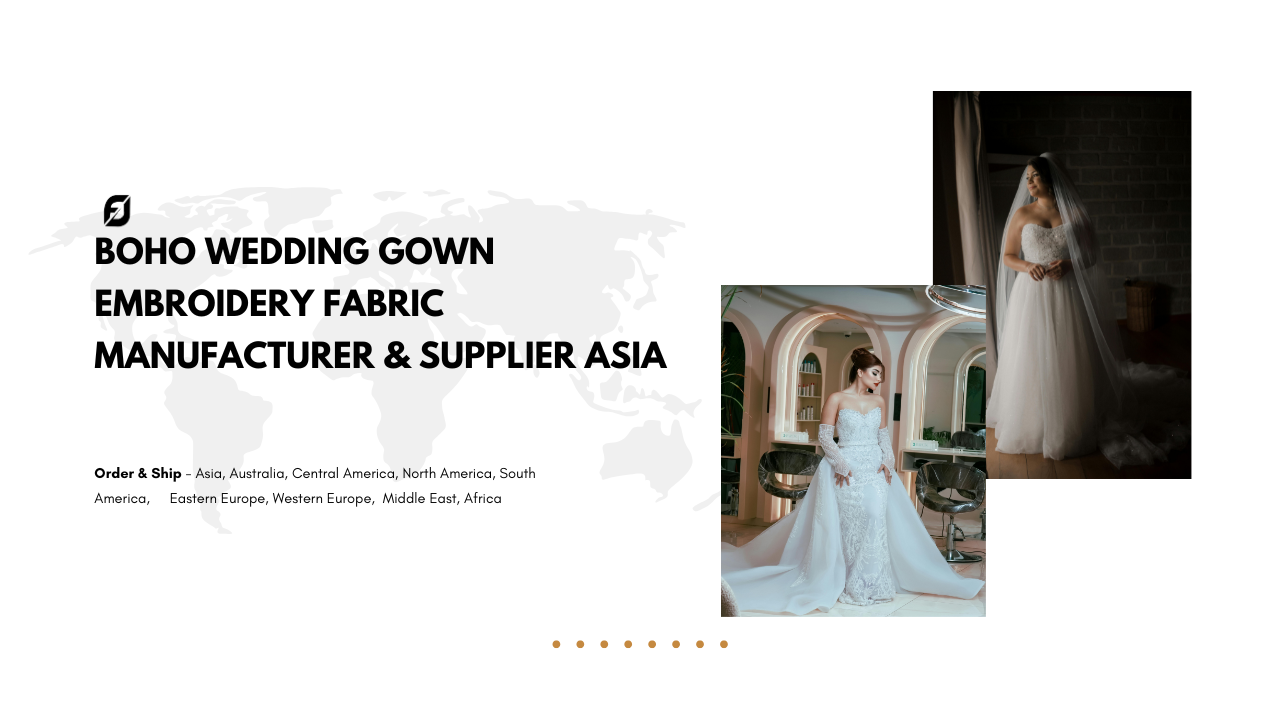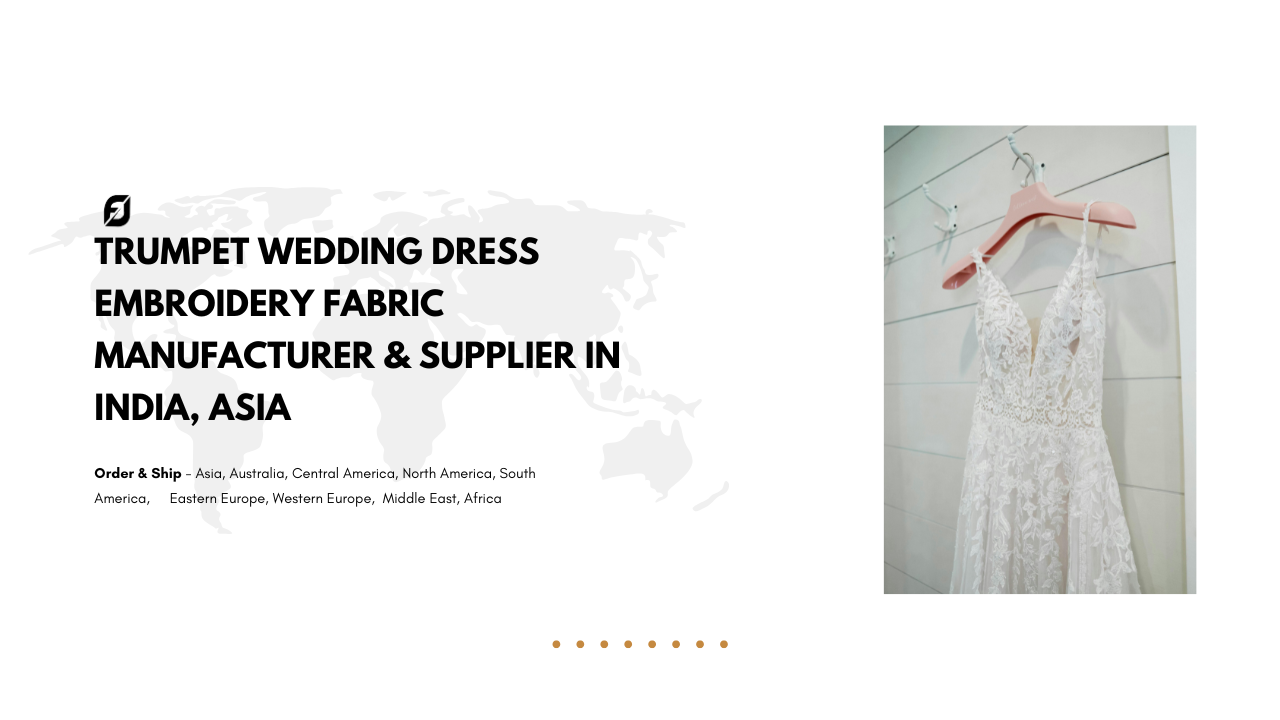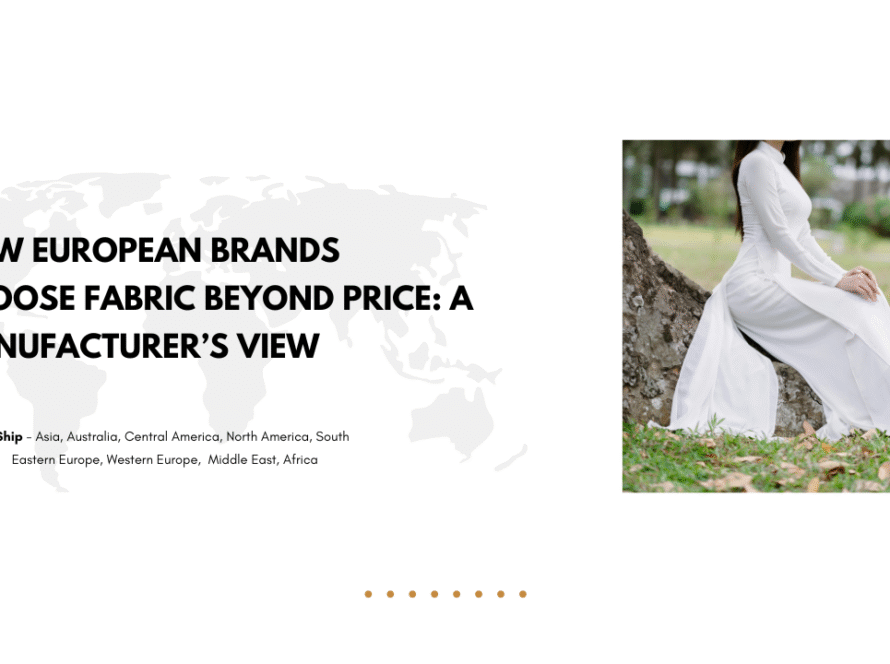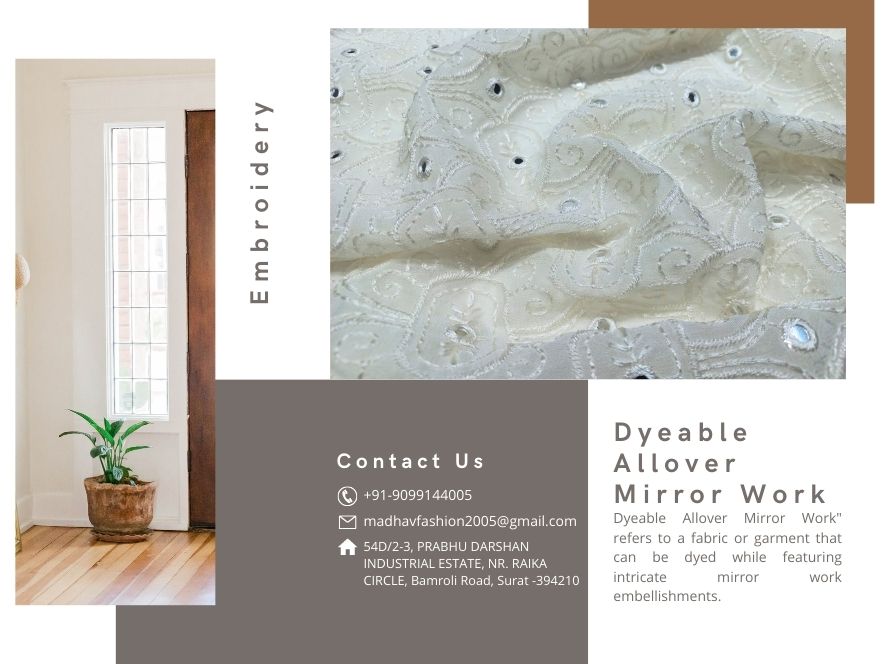Imagine a boutique owner in Delhi or a designer in London holding a sample dupatta against the light: the threadwork catches the sun, the motifs sit crisp on fine silk, and the fall is immaculate. That single piece can define a collection, make a look, and become a bestseller. But getting to that moment—finding a manufacturer who understands design intent, stitch quality, export needs, and timelines—is the real challenge.
This deep-dive guide explains how Madhav Fashion produces premium embroidered dupatta fabrics for brands, boutiques, and designers across India and abroad. You’ll get an inside look at materials, embroidery techniques, production workflows, quality checks, export readiness, timelines, pricing logic, and the buyer-supplier relationship that turns great fabrics into great business.
Top Embroidered Dupatta Fabric Manufacturer in India
Why Embroidered Dupattas Still Matter (Market & Design Context)
Embroidered dupattas are more than fabric—they are identity. Weddings, festivals, designer pret-a-porter and fusion collections rely on embroidered textiles to convey heritage, craftsmanship, and perceived value. In both domestic and export markets, embroidery sells because it communicates handwork, exclusivity, and storytelling—qualities mass-printed fabrics cannot match.
For retailers and designers, embroidered dupattas:
- Anchor premium price points.
- Help create signature collections.
- Serve as high-margin accessory items that enhance garment sales.
Madhav Fashion focuses on translating these market needs into reliable, scalable manufacturing without losing artisanal soul.
Fabric Bases: Choosing the Right Canvas
The choice of base fabric determines drape, stitch behavior, and final use. Common bases Madhav Fashion offers for embroidered dupattas:
- Silk (Chiffon, Silk Organza, Tussar, Banarasi variants): Luxurious sheen and refined drape—ideal for bridal and festive wear. Requires careful stabilization for embroidery.
- Georgette & Crepe: Lightweight with good movement; popular for designer and partywear dupattas.
- Organza & Net: Stiffer, translucent canvases used for heavy zari, sequin and zardozi work.
- Cotton (Handloom, Cambric): Breathable and suited for daily ethnic wear; best for thread and mirror work.
- Viscose / Modal blends: Offer cost-effective alternatives with good hand and print/embroidery compatibility.
Each base has trade-offs: sheer fabrics need backing or interlining during heavy embroidery; cotton shrinks if not pre-washed; silk needs colorfast dyes and low-tension stitching. Madhav Fashion advises on the ideal base during sampling.
Intricate threads & premium texture Printed Fabric
Creative, colorful & always trending Position Printed Fabric
Perfect alignment for standout looks Jacquard Fabric
Rich textures with woven luxury Plain Dyeable (RFD)
Customize colors, your way Pure Dyed Fabrics
Ready-to-stitch brilliance Designer Dupattas
From shimmer to sheer elegance Ready Stocks
Quick ship fabrics in bulk Kurti Fabrics
Comfort meets tradition New Arrivals
Fresh drops, every week
Embroidery Techniques — From Hand Heritage to Machine Precision
A successful embroidered dupatta Fabric balances artistry with reproducible quality. Key techniques used:
- Resham / Thread Work: Thread embroidery (silk, cotton threads) for floral and motif detailing. Offers fine texture and low weight.
- Zari & Zardozi: Metallic threads or wires for opulence. Zardozi involves raised metallic work—labor intensive but striking.
- Mirror & Sequin Work: Adds sparkle for festive wear; frequently combined with thread outlines for durability.
- Aari & Hand-Hook Work: Traditional Indian chain-stitching produced by skilled artisans; results in dense, textural patterns.
- Computerized / Digital Embroidery: High-precision machine embroidery for repeatable motifs and faster turnaround—excellent for larger batches with consistent quality.
- Tambour / Beadwork: Specialized techniques for couture-level pieces requiring hand-time and finesse.
Madhav Fashion uses a hybrid approach: handwork for high-value couture pieces and computerized/aari machines for larger production, ensuring both craft authenticity and scalability.
Design & Pre-Production: From Moodboard to Master Sample
A reliable production process starts before the first stitch:
- Design Brief: Buyer shares inspiration, color palette, target price point, and intended use.
- Technical Drawings / Digitization: Madhav’s in-house design team converts concepts into digitized embroidery files (for machines) or handwork specs (Embroidered Dupatta Fabric).
- Material Sourcing: Fabric selection, thread/yarn choice (resham, metallic, rayon), and accessory sourcing (sequins, mirrors, beads).
- Prototyping & Master Sample: A fully finished sample is produced for buyer approval—this includes stitch specs, backing, finishing and packaging mockup.
- Pre-Shipment Trial: For complex runs, a pilot batch is performed to confirm colorfastness, stitch integrity, and shrinkage.
This pre-production rigor ensures predictable outcomes and reduces costly reworks.
Quality Assurance — What We Check & Why It Matters
Premium embroidered dupatta Fabric must pass a strict QA protocol:
- Colorfastness Tests: Wash and perspiration tests to ensure dyes won’t bleed on light garments.
- Stitch Strength & Density: Ensures embroidery won’t pull or unravel with wear.
- Hand Feel & Drape: Finishing procedures preserve the fabric’s intended fall and texture.
- Seam & Edge Finishing: Proper selvage reinforcement and neat hemming prevent fraying.
- Accessory Fixity: Sequins, mirrors and beads are secured with extra stitching to survive repeated use.
Madhav Fashion issues lab test reports and sample certificates on request, helping buyers satisfy retail QA demands and import compliance.
Sustainability & Compliance: Certifications & Responsible Sourcing
Sustainability is increasingly a purchasing filter. Madhav Fashion supports:
- OEKO-TEX tested yarns and fabrics (on request).
- Low-impact dyes and processes to reduce effluent and chemical load.
- Ethical labor practices with documented working hours and fair wages at partner units.
Buyers can request test certificates (colorfastness, formaldehyde limits) and supplier documentation to meet brand compliance goals and retailer policies.
Minimum Order Quantities, Pricing & Lead Times
Clear expectations help buyers plan:
- MOQ: Flexible MOQs starting from 30 meters per design/color for select embroidered styles; higher MOQs for heavily hand-embroidered or bespoke motifs.
- Pricing Factors: Complexity (hand vs machine), fabric choice, embroidery density, accessories (zari, sequins), and run size.
- Typical Lead Times:
Madhav Fashion provides transparent proforma invoices with timelines and offers expedited options when feasible.
Export Ready: Documentation & Packaging for Global Buyers
For international buyers, Madhav Fashion handles the export checklist:
- Commercial Invoice & Packing List
- Certificate of Origin
- Export documentation (IEC, shipping bill / AWB / BL) — coordinated with freight forwarders
- Lab test certificates (if required by buyer/retailer)
- Custom packaging options: acid-free tissue, polybags, labeled cartons, hangtags and brand inserts.
Careful packaging prevents creases and protects embroidery during transit—critical for luxury exports.
Customization, Private Label & Collaboration Options
Madhav Fashion offers:
- Private Labeling: Custom tags and packaging for boutiques and labels.
- Co-development: Joint design sessions and seasonal capsule collections.
- Sampling Programs: Paid sample options that are often credited against bulk orders.
- Small-Batch Production: For designers testing market response before scaling.
These services make Madhav a partner rather than just a supplier.
A Delhi boutique approached Madhav Fashion for a limited festive collection of embroidered dupattas on silk organza. After two rounds of sampling and a small pilot (50 pcs), the boutique launched a 120-piece collection that sold out in four weeks. The key success factors were fabric choice (light organza), precise zardozi placement for comfort, and pre-approved finishing that enabled faster replenishment.
Packaging, Aftercare & Point-of-Sale Support
Madhav provides buyer-friendly finishing:
- Folded with acid-free tissue, tagged, polybagged.
- Care labels with washing/pressing instructions.
- High-resolution product photography on request (for e-commerce).
- Line sheets, swatch cards, and UPC/HSC codes to ease retail listing.
Aftercare instructions increase customer satisfaction and reduce returns—a small detail with big ROI.
How to Work with Us — Practical Buyer Steps
- Share your design brief and target price.
- Request a design/production estimate & MOQ confirmation.
- Approve master sample and lab test plan.
- Confirm PO and production schedule.
- Track production milestones and final inspection.
- Arrange shipping/forwarding or let Madhav coordinate.
Transparent communication and early sample approvals speed the process and cut costs.
___________________________________________
FAQs
Q1. What is the minimum order quantity for custom embroidered dupatta fabric?
A: Madhav Fashion offers flexible MOQs starting from 30 meters per design, though hand-embroidered couture runs may require higher minimums.
Q2. Can I get a finished ready-to-sell dupatta (stitched + finished) or only fabric by the metre?
A: Both options are available—buyers can order fabric by the metre or fully finished dupattas with hemming, borders and packaging.
Q3. How long does sampling and production typically take?
A: Sampling: 7–14 days. Production: 21–60 days, depending on embroidery complexity and order size.
Q4. Do you provide export documentation and lab test certificates?
A: Yes—commercial invoices, packing lists, certificate of origin, and test certificates (colorfastness, OEKO-TEX where applicable) can be provided.
Q5. Can Madhav Fashion produce private labelled or branded packaging?
A: Absolutely. Private labeling, custom hangtags, and bespoke packaging are available for bulk orders.
Q6. How do you ensure color consistency across batches?
A: We use standardized dye recipes, lab dips for buyer approval, pantone references, and pre-production trials to minimize batch variation.
Q7. Are sustainable or low-impact embroidered options available?
A: Yes. We can source OEKO-TEX tested fabrics and low-impact dyes, and offer organic cotton bases and responsibly-sourced threads on request.
Why Choose a Specialist Manufacturer
Embroidered dupattas bridge craft and commerce. A manufacturer must protect design intent while delivering operational reliability—timely samples, accurate stitchwork, export competence, and honest communication. Madhav Fashion combines artisan relationships, digital precision, and export readiness to deliver embroidered dupatta fabrics that perform in stores and online.
If you’re ready to commission samples, request a quote, or start a private-label capsule, reach out to Madhav Fashion for design consultation, swatches, and a production plan tailored to your market and margin goals.






